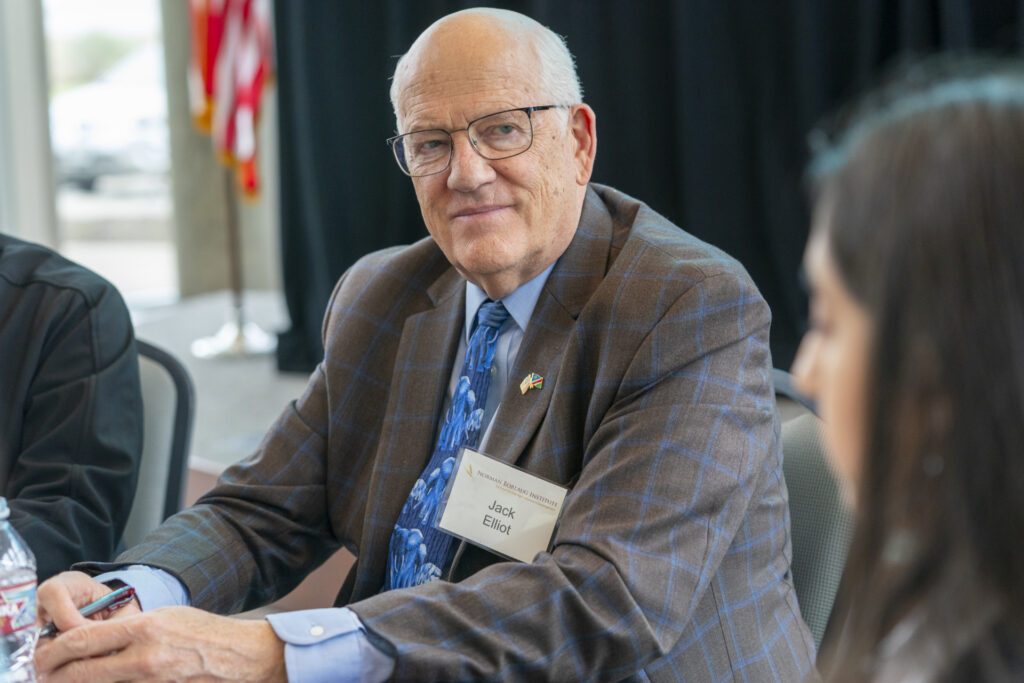Elliot receives national FFA honor
Texas A&M AgriLife professor, Borlaug Institute program director honored for career contributions
Jack Elliot, Ph.D., who has spent a lifetime dedicated to agricultural education, was recognized for his service by the National FFA Organization at the 96th National FFA Convention and Expo in Indianapolis Nov. 1-4.
Elliot said he is humbled to receive the FFA National VIP Award. More so, it will be a special moment as both his wife and son will attend the ceremony.
“This award is the best kind because it came out of the blue; I did not apply for it,” said Elliot, who serves as regional Africa director for the Borlaug Institute for International Agriculture and as professor in the Texas A&M College of Agriculture and Life Sciences Department of Agricultural Leadership, Education and Communication.

The VIP award citation honors individuals who have dedicated 20 years of service to FFA and agricultural education on a national level.
Agricultural education in his blood
Agricultural education has always been a part of Elliot’s family tradition. His agricultural education began during childhood when his father was a high school agricultural education teacher.
“I grew up in the days when most participants in FFA were boys,” he recalled. “My dad was always innovative and welcomed women members in the 1950s, long before it became official in 1969.”
Elliot earned his bachelor’s degree in agricultural education and master’s degree in agricultural economics from Washington State University. He received his doctorate in agricultural education from The Ohio State University.
Despite his father being an educator, Elliot admits that wasn’t a career path he thought he would pursue.
“I never thought I would teach,” he said.
Elliot spent his early career days farming in Montana. A life-changing event altered his career path. He was scheduled to ride with a group of FFA members into town for a livestock judging event, only to have his schedule change at the last minute.
“Tragedy happened,” he said. “I was supposed to be in a vehicle headed to the judging contest. It was snowing so bad, I told the group I was supposed to ride into town with that I would meet them. I came upon the wreck; two of the students were killed, and the ag teacher was injured.
“I was already on the agricultural education advisory committee and had the teaching certifications and expertise. I was appointed the high school agriculture teacher that following Monday.”
Elliot said farming was enjoyable and rewarding, but he discovered he was highly allergic to grain bin dust.
“We had 1,700 acres that we farmed and a beef cattle operation,” he said. “I eventually went back into teaching. I enjoyed it so much I got a doctorate,” he said.
Helping build the FFA curriculum
One of Elliot’s career stops included serving as a professor and department head at the University of Arizona. That’s when his involvement with the National FFA began, and it hasn’t stopped for almost three decades.
“While at Arizona, I was heavily involved in National FFA,” he said. “Some 20 years ago, I was elected to be on the National FFA board of directors for a three-year term.”
During that time, Elliot said they created a Life Knowledge project with the U.S. Department of Agriculture.
“It was a giant curriculum project where we created a national onboarding service for educators,” he said. “We did a collegiate Life Knowledge training and leadership training supported by National FFA. We took that, and it all evolved into professional development for the American Association of Agricultural Educators.”
He conducted Life Knowledge training for three summers and pilot-tested the New Professional Kit. Part of his work also included reviewing collegiate life knowledge curriculum, evaluating its effectiveness and presenting results at regional and national meetings.
Elliot co-chaired the National FFA Leadership Continuum Committee and judged the National FFA Proficiency Awards for three decades.
He said FFA offers the premier educational strategy, providing all types of activities for young people, no matter their talents or skill sets.
“The school-based agricultural education model makes a powerful process. It allows everybody in the high school classroom to participate, not just the people who memorize well, but also those who are good with their hands,” he said. “FFA has venues for all people, talents and different skill sets.”


